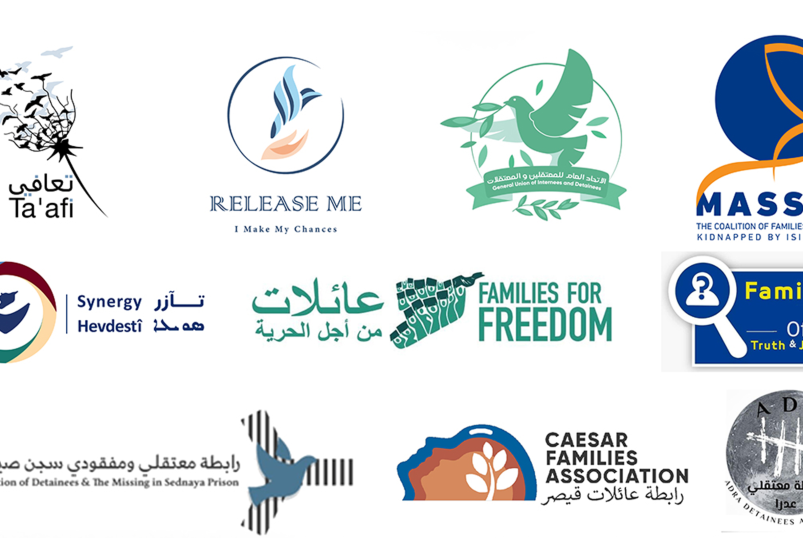We, the survivors and families of the more than 100,000 Syrians who have been forcibly disappeared since 2011, regard the search for the missing as an essential step towards building peace.
But the work of determining the fate and whereabouts of the disappeared is complex, requiring considerable resources as well as coordination between state institutions, international organizations, victims’ groups, civil society organizations and forensic anthropologists. It is, therefore, essential that UN Member States act promptly to establish a missing person institution as outlined by the recommendations of the UN Secretary-General. The time to act is now.
The earthquakes that hit southern Turkey and northern Syria on February 6 were a tragedy for the world that worsened the situation for the victims’ families and the survivors. The victims included family members of the missing who will now never see the faces of their loved ones and learn their fate. The earthquakes caused the loss of evidence and testimonies that would’ve been essential in saving those detainees and missing persons who are still alive.
By voting to create the UN institution as quickly as possible – which would be mandated to (1) clarify the fate of the missing persons and (2) provide adequate support to the families – Member States can rescue those who are still alive and make a forthright stand on behalf of the universal values enshrined within the UN Charter.
The use of enforced disappearance is not a new phenomenon in Syrie. Since the late 1970s, the Syrian authorities have pursued a policy of repression based on enforced disappearance against all those who follow the path of political opposition, critical thinking and human rights activism. An estimated 17,000 cases of enforced disappearance occurred during the reign of Hafez al-Assad, most of them dating back to the 1980s.
The use of this policy has increased considerably since the 2011 uprising. It would be difficult to determine the exact number of the disappeared, as most prisons and detention centers are not open to observers. According to the Syrian Network for Human Rights (SNHR), more than 100,000[1] people have gone missing or forcibly disappeared in Syria since 2011, including at least 90,000 by government forces.
UN Security Council resolution 2139, adopted in February 2014, strongly condemned the abductions and enforced disappearances in Syria and demanded that these practices be stopped and that all those detained be released. Nevertheless, no concrete steps have been taken to implement this resolution, and multiple attempts at political negotiations have failed to achieve any progress.
In 2016, associations of survivors and victims’ families were formed and took the lead in the efforts to reveal the fate of their missing relatives. On the 10th of February 2021, 5 of these associations, which later became ten, launched The Truth and Justice Charter, which sets out their vision for implementing justice in the short term, which involves emergency measures such as releasing detainees and uncovering the fate of the disappeared, and in the long term that involves reparations and accountability of perpetrators of crimes committed. In order to concretise this vision, a study has been carried out on the need to set up a mechanism to reveal the fate of the missing in Syria, entitled “Humans, Not Numbers: The Case for an International Mechanism to Address the Detainees and Disappeared Crisis in Syria“.
On the 24th of December 2021, the UN General Assembly adopted resolution 76/228, in which it invited the UN Secretary-General to conduct a study, in consultation with the Office of the High Commissioner for Human Rights, on “how to bolster efforts, including through existing measures and mechanisms, to clarify the fate and whereabouts of missing people in the Syrian Arab Republic, identify human remains and provide support to their families”.
The study responded to the aspirations of the victims’ families by calling for the creation of an institution to reveal the fate and whereabouts of the disappeared. The UN General Assembly committed itself in its resolution 77/230 of the 15th December 2022 to take further steps to address the issue of enforced disappearances while ensuring the involvement of survivors and families of victims in all stages of this process.
UN General Assembly Resolutions 76/228 and 77/230 set out a clear path to address this crisis. You, as UN Member States, cannot miss this opportunity. We now have clear recommendations from the Secretary-General that will allow this issue to be resolved. The time for talk is over, and you must act unless you take it upon yourself to delay efforts to find a solution.
Therefore, we call on all Member States to support the swift implementation of the Secretary-General’s recommendations by promoting a resolution through the General Assembly, allowing for the establishment of an institution to reveal the fate of missing persons while ensuring that victims have a central role in the process.
The opportunity to establish the institution will only present itself once, and Member States must assume their responsibility to history and the hundreds of thousands of Syrians affected by the crime of enforced disappearance. Letting this opportunity pass would be a historic mistake.
Members of the Truth and Justice Charter
- Adra Detainees Association
- Association of Detainees and the Missing in Sednaya Prison (ADMSP)
- Caesar Families Association
- Coalition of Families of Persons Kidnapped by ISIS-Daesh (Massar)
- Families of the Missing for Truth and Justice
- Families for Freedom
- General Union of Detainees
- Synergy Association for Victims
- Release Me
- Ta’afi Initiative
[1] Syrian Network for Human Rights, Record of enforced disappearances, online: Record of enforced disappearances | Syrian Network for Human Rights (snhr.org)

